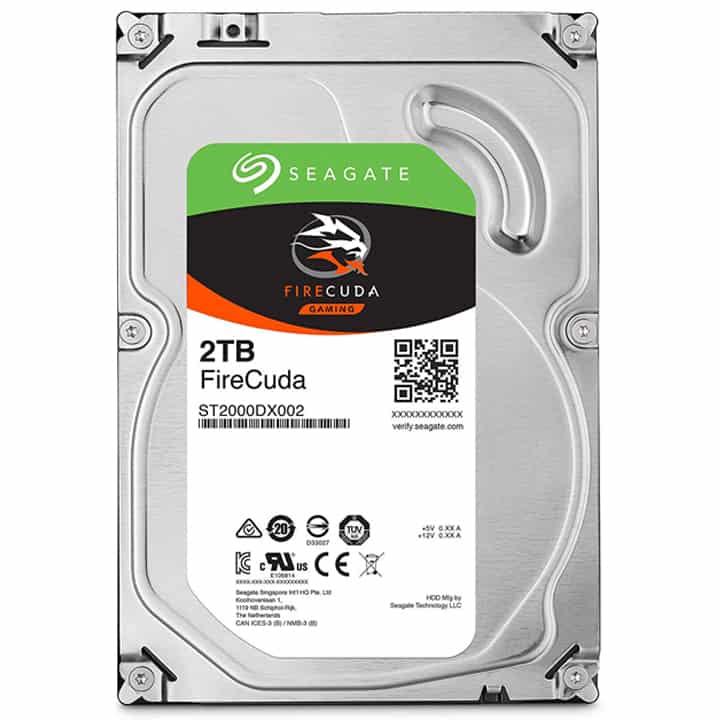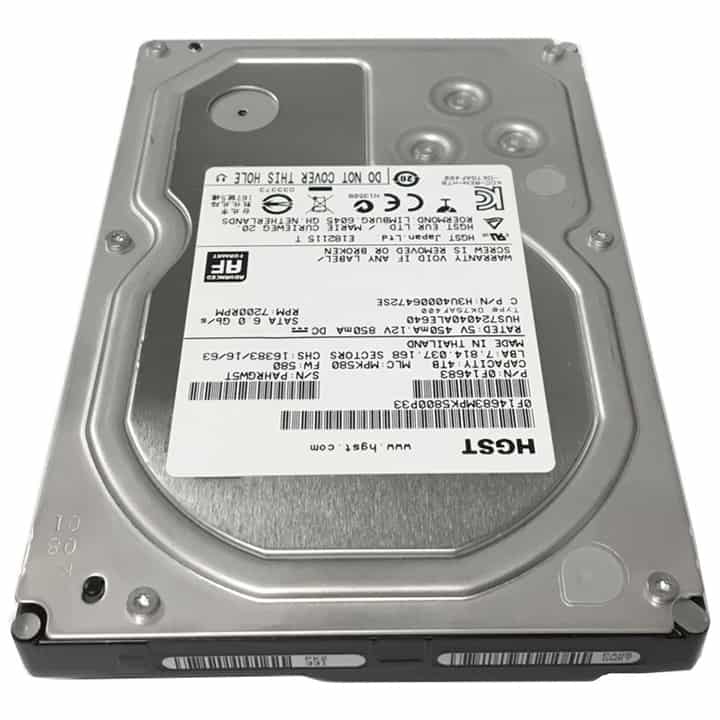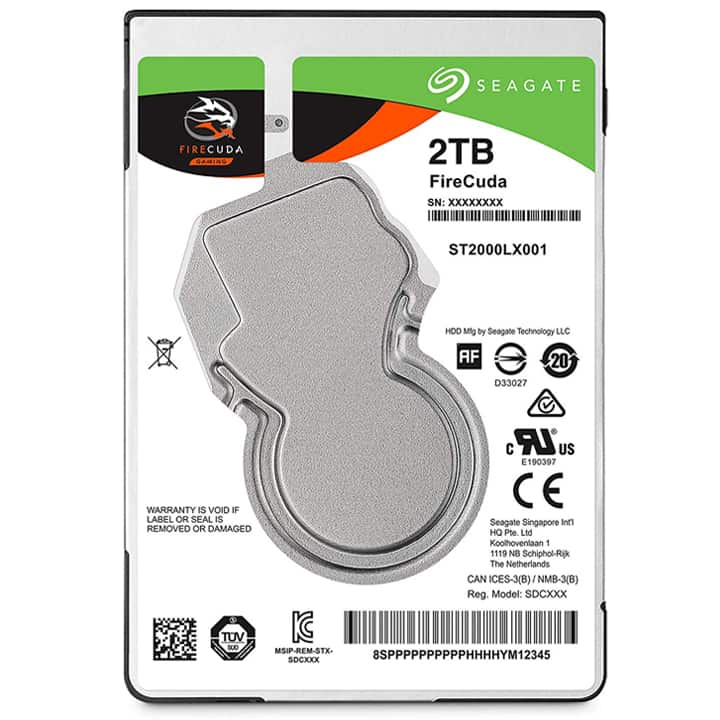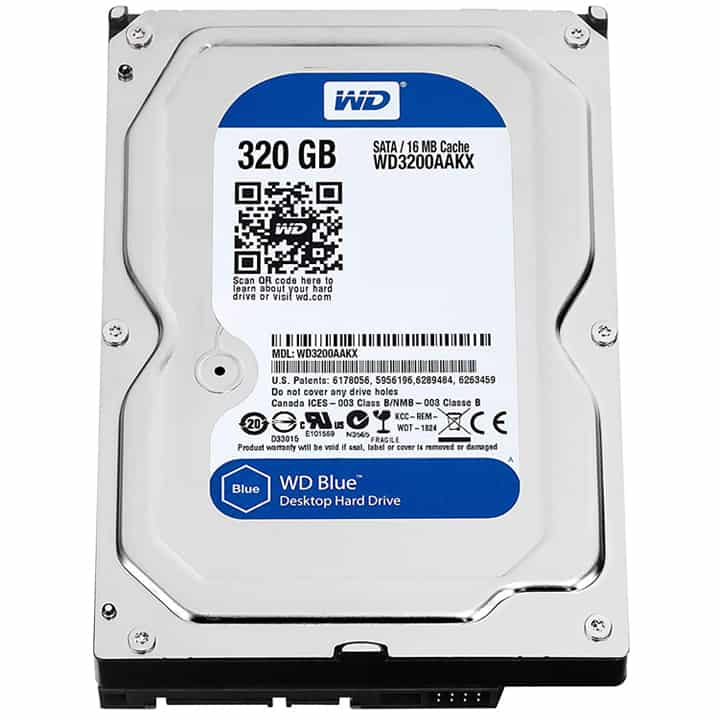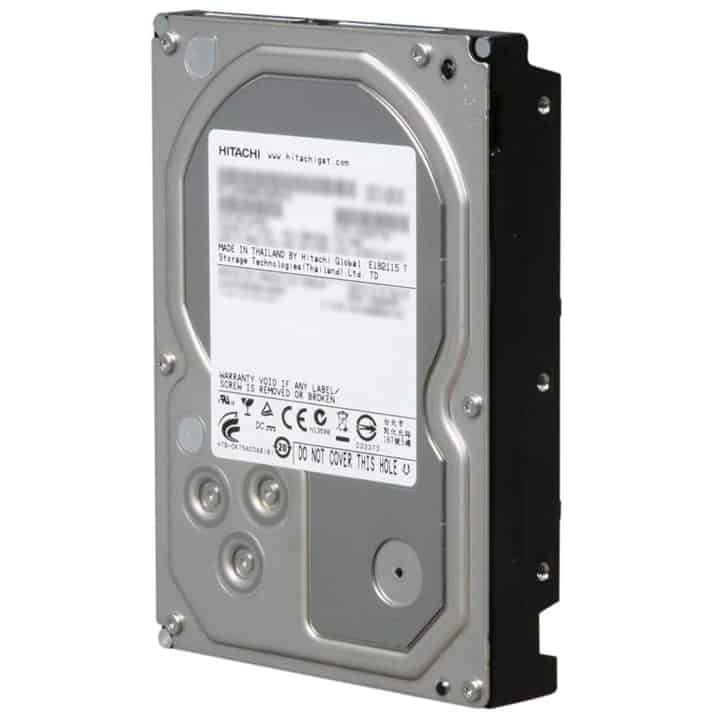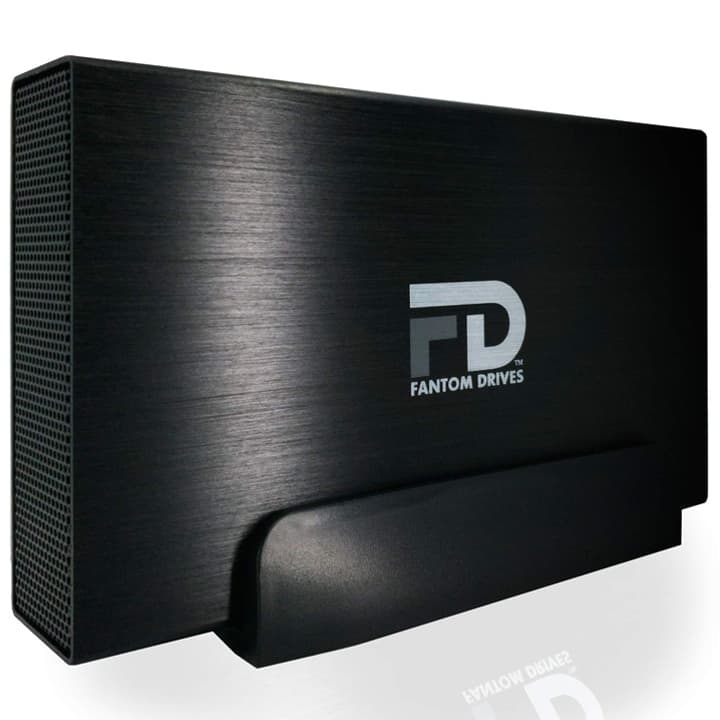When it comes to PC gaming, it’s easy to forget hard drives since they aren’t as sexy as other parts and are much more interchangeable. And yet, they are one of the most important things to take into consideration. The storage you have available will determine how much of your favorite games and media you can have at once, and the speed of that storage will determine how quickly it loads for you.
In this article, we’re going to tackle everything you need to know about hard drives and help you find the best HDD for gaming. (At least, the best one for you.) We’ll be covering everything from cheap HDDs to SSHDs, so stay tuned!
fastest drive
Seagate FireCuda 2TB 3.5 Inch SSHD
- Technology: SSHD
- Size: 3.5 Inch
- RPM: 7200 RPM
- Cache: 64 MB
- Interface: SATA
Strong pricing and value
Hitachi Ultrastar A7K4000 4TB HDD
- Technology: HDD
- Size: 3.5 Inch
- RPM: 7200 RPM
- Cache: 64 MB
- Interface: SATA
Small size
Seagate FireCuda 2TB 2.5 Inch SSHD
- Technology: SSHD
- Size: 2.5 Inch
- RPM: 5400 RPM
- Cache: 128 MB
- Interface: SATA
best budget
WD Blue 320GB HDD
- Technology: HDD
- Size: 3.5 Inch
- RPM: 7200 RPM
- Cache: 16 MB
- Interface: SATA
best value
Hitachi Ultrastar 7K3000 3TB HDD
- Technology: HDD
- Size: 3.5 Inch
- RPM: 7200 RPM
- Cache: 64 MB
- Interface: SATA
best external
Fantom Drives 2TB External Hard Drive
- Technology: HDD
- Size: 3.5 Inch
- RPM: 7200 RPM
- Cache: Unknown
- Interface: USB 3.1/USB 3.0
Table of Contents
1. Seagate FireCuda 2TB 3.5 Inch SSHD
This hybrid drive is the best hard drive for gaming PCs

- Technology: SSHD
- Size: 3.5 Inch
- RPM: 7200 RPM
- Cache: 64 MB
- Interface: SATA
- The fastest drive on this list
- Plenty of storage space
- High price
If you want the best HDD for gaming, the Seagate FireCuda is probably it.
To elaborate on that more, let’s explain what FireCuda actually is. Seagate’s normal hard drives are the “Barracuda” series, but the FireCuda series aren’t traditional hard drives. Instead, they are something called SSHDs, or Solid State Hard Drives. These combine SSD and HDD technology to create a faster breed of hard drive. The 3.5 Inch FireCuda uses this technology to be the fastest hard drive for gaming (or anything else, really), bar none.
If you can’t afford an SSD but still want the massive storage capacity of a traditional HDD, the FireCuda may just be the right compromise for you. At least based on speed and performance, we have to give FireCuda the crown here.
While the FireCuda might be the best internal hard drive for gaming, its benefits do come at a price. Very literally, in fact-- FireCuda drives are much more expensive than their standard HDD counterparts. Additionally, 2TB seems to be the highest capacity that FireCuda drives can reach-- 3TB and higher tiers are not available yet, and they may never be due to hardware limitations.
2. Hitachi Ultrastar A7K4000 4TB HDD
Hitachi gives us the best capacity hard drive for gaming

- Technology: HDD
- Size: 3.5 Inch
- RPM: 7200 RPM
- Cache: 64 MB
- Interface: SATA
- Stellar storage space
- Strong pricing and value
- Slower than SSHDs
- Manual formatting required to use 4TB
If you’re buying a hard drive to use alongside an SDD, the Hitachi Ultrastar A7K4000 is a great place to start and will serve as a good hard drive for your gaming computer. In terms of consumer hard drives, this is easily the best you’re going to get-- 4TB of storage for under $100? That’s a dream come true!
However, there is a catch-- you will need to format this hard drive as GPT to use all 4TB. With standard MFT formatting, only 2TB of storage will be available. Click here to see a tutorial on how to get that set up. Once you’ve done this, you’ll get to use this drive to its fullest potential.
We’ve selected this drive instead of other options for a few reasons. Pricing is one of them, but quality and reliability is another. Hitachi is widely-considered to be one of the most reliable drive manufacturers out there, even more so than Seagate and Western Digital. We’re inclined to agree, so we decided to opt for the Hitachi drive here, so you’re less likely to deal with drive failure.
3. Seagate FireCuda 2TB 2.5 Inch SSHD
The best laptop hard drive looks familiar, doesn’t it?

- Technology: SSHD
- Size: 2.5 Inch
- RPM: 5400 RPM
- Cache: 128 MB
- Interface: SATA
- Faster than conventional HDDs
- Small size means laptop/console compatibility
- High price
- Slightly slower than 3.5 counterpart
“Wait a second!” some of you might be saying, “This is just the same hard drive from earlier!”
Not quite. This is actually a 2.5-inch version of the 3.5-inch FireCuda, and that actually does change a good few things.
Most importantly, this drive is smaller. Small enough to fit inside laptops and gaming consoles. That means this is the best hard drive for PS4 and the best hard drive for laptops. Thanks to SSHD speeds, this will far exceed the capabilities of a standard 2.5-inch 5400 RPM hard drive, though there are notable downsides.
First up, this one will actually be slower than its larger cousin. This is because smaller drives are forced to have a lower RPM-- we’ll explain the difference in more detail in the buying guide. This drive is also much more expensive than your typical 2.5-inch hard drive, though its price keeps parity with its 3.5-inch big brother.
If you’re using a console or laptop, this is the fastest hard drive you’re going to find.
4. WD Blue 320GB HDD
Western Digital gives us the best budget hard drive

- Technology: HDD
- Size: 3.5 Inch
- RPM: 7200 RPM
- Cache: 16 MB
- Interface: SATA
- Entry-level drive
- Standard speeds
- Poor value for money
- Way too limited on storage
If you have little-to-no money to spend on storage, we understand. If you just need a hard drive to get your PC working properly or to start with before upgrading in a few weeks, then the WD Blue 320GB is your best bet.
Western Digital is one of the most reliable hard drive manufacturers out there, and their budget options are particularly good. While the storage on this drive is undeniably limited, its price is pretty much unbeatable. We don’t recommend this hard drive as your daily driver for too long if you’re doing any sort of heavy lifting-- gaming, media, work station, etc-- but if you’re smart about your storage space, it’ll treat you just fine.
What’s important when buying drives cheap is buying them new and making sure they come from a reputable manufacturer. (You always want new drives, since used/refurbished drives will have highly variable lifespans.) This drive runs at a full 7200 RPM and meets all of those needs, so we’re comfortable with recommending it to those on the tightest of budgets.
5. Hitachi Ultrastar 7K3000 3TB HDD
Hitachi gives us the best value hard drive

- Technology: HDD
- Size: 3.5 Inch
- RPM: 7200 RPM
- Cache: 64 MB
- Interface: SATA
- Great pricing
- Standard speeds
- Not as fast as an SSHD
The Hitachi Ultrastar 7K3000 is our pick for best value hard drive. It’s recently had a price drop-- a massive price drop, all the way down to just under $60. 3TB of storage for that price is utterly nuts, and you’re getting all that storage without losing out on reliability, too. Hitachi’s drives are among the most reliable in the industry, and you aren’t losing out on anything by saving money here.
Of course, this drive won’t be as fast as an SSHD-- but we’ve hammered that point home for every standard HDD by now. If you just want the best hard drive for the money, then Hitachi has every other option on this list beaten, hands down-- even their own 4TB drive!
6. Fantom Drives 2TB External Hard Drive
The best external hard drive for gaming

- Technology: HDD
- Size: 3.5 Inch
- RPM: 7200 RPM
- Cache: Unknown
- Interface: USB 3.1/USB 3.0
- Strong pricing
- USB 3.0 enables full-speed transfers
- Full desktop drive speed
- Not as fast as an SSHD drive
Last but not least… we have the best external hard drive for gaming!
External hard drives are useful for console and laptop gamers who don’t want to open up their machines for hard drive replacement. External HDDs are also great for gamers who use multiple machines a day for any reason, from media consumption to gaming, to productivity. If you want a high-performance external hard drive, then Fantom Drives’ line is easily your best bet.
If you’re worried about lost speed, don’t be-- the bandwidth of a USB 3.0 connection far exceeds the speed of even a 7200 RPM desktop hard drive. According to our own tests and external reviews, the performance of this drive is in line with standard desktop hard drives, which means there is pretty much no downside to running it. It is pretty bulky, though, and requires its own power to run.
If you don’t mind something slower and want to keep it small, also consider the WD Elements Drive, which adds 1TB for about the same price.
How To Buy The Best Hard Drive For You
If you aren’t familiar with PC hardware or PC gaming in general, you may be a little in the dark going through this article. Don’t worry, we’re here to answer any questions you might have– either in this section or in the comments below– while searching for the best storage for your gaming PC.
Average Game Sizes and Storage Capacity
First and foremost, let’s talk average game sizes, to put things in perspective.
Your typical AAA modern game will be anywhere from 25-50 GB on its own. Some may even go higher than that, but few, if any, ever breach 100 GB. Let’s average things out a little bit and say that you can fit three modern games in your average 100 GB of space.
This means that each terabyte of storage equals roughly 30 games… that is if all of your games are AAA and 3D. Lower-budget indie games, especially 2D games, will take much much less space, as will last-gen and older AAA games. Truth be told, 30 games to a terabyte is closer to a worst-case scenario than an average, and if you can afford to buy that many games to begin with you can afford a bigger hard drive.
Below, we’re going to list common drive sizes and what they’re good for.
500GB
This is for the starting budget gamer or casual gamer. You don’t have a massive Steam library built up, you don’t play many games at all, or all the games you play are smaller indie titles. This will satisfy your needs until you start filling your game library, but hopefully by that point, you can afford to step up to a larger storage drive. Otherwise, you’ll need to delete some stuff to make room.
1TB (1000GB)
This is one of the most common hard drive sizes, especially if you’re trying to buy cheap. 1TB will hold a fairly generous assortment of games, even if you have a large Steam backlog. However, this will begin to show its limits eventually, especially as games continue to balloon in file size.
2TB (2000GB)
This is another one of the most common hard drive sizes and is generally where you find the best bang for your buck. Even if you exclusively play modern games and buy them on a regular basis, it’ll take quite a while to fill a drive of this size to capacity… unless you’re also doing frequent video recording or media downloads.
3TB (3000GB) or higher
This is the high end of hard drives, and you don’t typically see hard drives much bigger than this. (At least, not in the consumer space– server-grade hard drives are different, and can end up getting quite a bit larger than this.)
If you plan on having your gaming PC for a very long time and don’t intend on upgrading it any time soon, 3 TB or more is a great way to make sure that storage is the least of your worries for the foreseeable future.
What are SSHDs?
SSHDs, or Solid State Hybrid Drives, are a hybrid between Solid State Drives (SSDs) and Hard Disk Drives (HDDs). They are overwhelmingly HDDs, but with small SSDs built-in as a cache to allow faster access to frequently-used content and an across-the-board speed boost. (SSDs are a topic for another article entirely but know that they are much faster than any HDD… and much more expensive.)
For the most part, this truthfully won’t have the same impact as a proper SSD, and it will make your mostly-standard HDD more expensive. If you want to find a middle ground between the two standards, though, this is probably your best bet.
Form Factors and Why They Matter
In this section, we’re going to go over common form factors, what they’re compatible with, and what limitations they might have.
2.5-Inch Drives
2.5-inch drives are significantly smaller than 3.5-inch drives, and most commonly seen in laptops and gaming consoles. 2.5-inch drives are also the go-to choice for external hard drives. In addition to HDDs, 2.5-inch enclosures are also often used for SATA SSDs.
2.5-inch drives do come with a notable downside: lower RPM. Because of physical limitations inherent to smaller hard drives, 2.5-inch drives can only achieve 5400 RPM, as opposed to the desktop standard of 7200 RPM. We’ll explain the difference this makes a bit later.
3.5 Inch Drives
3.5-inch drives are the standard hard drive size, and usually seen in typical desktop PCs. They are much larger and heavier than 2.5-inch drives, but can also achieve much higher RPM: 7200 RPM. Outside of consumer hard drives, some server drives can reach even higher RPM numbers, but those are generally being replaced by SSDs these days.
RPM and Cache
RPM is a measure of Rotations Per Minute, and it corresponds closely to read/write speed. The higher your RPM, the faster your drive will operate when reading, writing, copying, or deleting files.
5400 RPM
5400 RPM is most commonly seen in 2.5-inch drives. As stated prior, these are typically used in consoles and laptops, and now you know that this does come with a performance penalty.
Fortunately for 2.5-inch drive users, the addition of SSHDs (like the FireCuda listed in the article above) and SSDs greatly improve the speeds possible on smaller drives.
7200 RPM
7200 RPM is seen on full-sized desktop hard drives. This is the ideal for any consumer hard drive since it will allow the drive to reach its maximum read/write performance potential.
7200 RPM SSHDs will enjoy an even further performance benefit.
Cache
In layman’s terms, hard drive cache, or disk buffer, temporarily holds data while the hard drive physically moves around data.
As long as you have a standard cache size– 64 MB or higher– you’re good here. Smaller cache sizes are okay and expected on drives smaller than 2TB. SSHDs tend to have higher cache sizes in order to further increase speed, but for standard 7200 RPM HDDs this number doesn’t matter as much.

